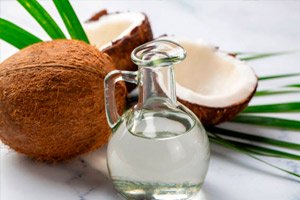
All iLive content is medically reviewed or fact checked to ensure as much factual accuracy as possible.
We have strict sourcing guidelines and only link to reputable media sites, academic research institutions and, whenever possible, medically peer reviewed studies. Note that the numbers in parentheses ([1], [2], etc.) are clickable links to these studies.
If you feel that any of our content is inaccurate, out-of-date, or otherwise questionable, please select it and press Ctrl + Enter.
Natural Alternative to DEET: Coconut Fatty Acids Provide Long-Lasting, Safe Protection Against Mosquitoes, Ticks, and Bed Bugs
Last reviewed: 03.08.2025
 ">
">Scientists from the U.S. Agricultural Service (USDA) have discovered that certain free fatty acids extracted from coconut oil have a powerful and long-lasting repellent effect against a variety of insects, from mosquitoes and bloodsucking flies to bedbugs and ticks. The study was published in the journal Nature.
In some experiments, these natural ingredients were found to be more effective than the synthetic repellent DEET, which is now considered the gold standard in insect protection.
What exactly did scientists discover?
USDA researchers (including Junwei Zhu, one of the lead authors) tested C8:0, C10:0, and C12:0 fatty acids—caprylic, capric, and lauric acids—derived from fractionated coconut oil.
Key results:
- In vitro tests of acid mixtures:
- Provided up to 93-100% protection against Aedes aegypti mosquito bites for 2 hours.
- Provided up to 96 hours of protection against blood-sucking flies in animals (cows).
- Suppressed tick adhesion and bites for a week.
- Prevented bed bug bites for over 14 days after a single treatment.
By comparison, DEET typically repels flies or mosquitoes for up to 8 hours, while natural oils (e.g. eucalyptus, citronella) provide up to 2 hours of protection.
Why is this important?
1. Naturalness and safety
These acids are found in food additives and cosmetics and are recognized as safe by the FDA (GRAS).
Non-toxic, non-irritating to skin and does not have an unpleasant odor like DEET.
2. Long-term action
Unlike many essential oils, coconut fatty acids are resistant to evaporation and sunlight.
They slowly penetrate the skin, providing long-lasting protection.
3. Mechanism of action
Acids affect the olfactory receptors and chemoreceptors of insects, disorienting them.
Attachment and bites are also disrupted, especially by ticks and bedbugs.
How the study was conducted
Gels and emulsions containing 10–25% fatty acids were used.
Tested on:
Laboratory mice and rabbits.
Cows in a pasture being attacked by flies.
Isolated areas of skin with ticks, mosquitoes, bedbugs.
Compared with:
DEET (standard product).
Neem oil, soybean oil, citronella and lemongrass oils.
Application and Prospects
| Product | Action | Protection period |
|---|---|---|
| Caprylic/lauric acid blend | from mosquitoes | 2-6 hours |
| As part of starch paste (on cows) | from flies | 4 days |
| In the laboratory (on fabric) | from bedbugs | >14 days |
| Against ticks | on the skin | up to 7 days |
Possible forms:
- Creams and lotions.
- Impregnated fabrics.
- Sprays for animals.
- Repellents for agriculture and camping.
Limitations and Future Research
- High concentration is required to achieve complete protection.
- Long-term safety with chronic skin use has not been studied.
- Efficacy in high humidity and heat conditions needs to be confirmed.
- In the future, microencapsulation or nanoformulas may be possible to enhance the effect at a lower dose.
Conclusion
Coconut oil fatty acids are a promising alternative to DEET, offering:
- highly effective against a wide range of insects;
- safety for humans and animals;
- stability and durability of action.
The discovery could change the way we develop natural repellents, especially as insects become increasingly resistant to traditional chemicals.
